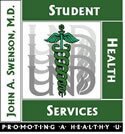|
Sexually Transmitted Diseases
Sexually transmitted diseases (STDs) are infections you catch through sexual contact. Bacterial STDs (gonorrhea, chlamydia, and syphilis) are relatively easy to cure with antibiotics if caught early. Viral STDs, like genital herpes and AIDS, are often incurable. Knowing the signs and symptoms is crucial in order to get early treatment of a STD.
- Chlamydia is a bacteria infection that often has no symptoms. Some women and men report a mild mucous-like discharge from the genitals or stinging when urinating. Women may have abdominal pain and men may have testicular pain. Because there are often no symptoms, regular screening for Chlamydia is recommended, if you are sexually active or have a new partner. Chlamydia can be treated with antibiotics.
- Gonorrhea is a bacterial infection that can cause arthritis, dermatitis, heart problems, and reproductive problems in both men and women if left untreated. Some men experience a creamy, pus-like penile discharge and have a burning sensation while urinating. Some women have vaginal discharges and pain when urinating. Many women and some men show no symptoms. Regular screening for gonorrhea is recommended if you are sexually active. Gonorrhea can be treated with antibiotics.
- Syphilis is a bacterial infection that occurs in three stages. Symptoms of primary syphilis usually occur three weeks after exposure and include a painless sore called a chancre that appears on the vagina, cervix, vulva, mouth or penis. Signs of secondary syphilis occur six to eight weeks after exposure and include swollen lymph nodes, skin rash, hair loss, or flu-like symptoms. Syphilis can be treated with antibiotics. If left untreated, syphilis will cause death or permanent disability. If you think you have syphilis or have been exposed, contact your health care provider immediately.
- Genital herpes is caused by a virus that produces painful, inflamed blisters on the penis, in the vagina, on the cervix, or around the anus. The first episode is usually the most severe, and although the initial outbreak subsides, herpes often recurs. Just before a recurrence, there may be burning, itching, or tingling at the blister site. These symptoms indicate that the virus may be present and is easily transmissible until the blisters have completely disappeared. Persons with herpes should not have sexual relations from the time any prodonal symptoms appear until the blisters have cleared up. A health practitioner can prescribe medicine to soothe the pain and reduce the frequency and severity of outbreaks.
- Genital warts is a sexually transmitted disease that is caused by human papillomavirus (HPV). HPV is a large family of viruses that infect the skin, often causing irregular cell growth which may result in fleshy bumps known as condylomata or warts. Not all HPV infections cause visible warts. Approximately 30 varieties of HPV can infect the genital area (penis, vagina, anus, and perineum). Some types of HPV can cause cervical cancer in women. HPV is transmitted through contact with infected skin during sexual activity. Visible warts may appear two to three months or more after infection and in some cases, warts may not develop at all. However, because the virus is present in the skin, transmission is possible even though there are no visible signs of infection. Genital warts range from soft, fleshy, cauliflower-like growths that are easily seen to small round or flat bumps that are barely visible. They are painless, but may bleed easily or itch. They occur on the vulva, in or around the vagina or anus and on the penis, scrotum, groin, or thigh. Quite often there are no visible signs of infection. This is known as "subclinical" or unapparent infection. A person can pass the infection to their sexual partners whether there are visible warts or not, which is one reason why HPV infection is so common.
-
HIV Infection and AIDS can be transmitted through sexual contact and by sharing intravenous needles for any purpose. Most people with HIV show no symptoms, but it is still possible to transmit the virus. Medical treatments and self-care strategies can both slow down the progression of HIV and prevent or modify some complications. Student Health Services offers free and confidential HIV testing.
Resource Links:
v University of Illinois-UC, MicKinley Health Center. Chlamydia and
instructions for partners. (Chlamydia trachomatis)
(www.mckinley.uiuc.edu/health-info/dis-cond/commdis/chlamydi.html)
v University of Illinois at Urbana-Champaign, MicKinley Health Center. Warts. (www.mckinley.uiuc.edu/health-info/dis-cond/warts/warts.html)
 Back to Top 20 Health Issues Back to Top 20 Health Issues
|
|


